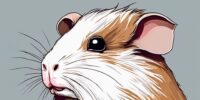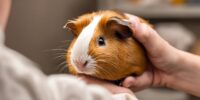How to Manage Chronic Conditions in Elderly Guinea Pigs
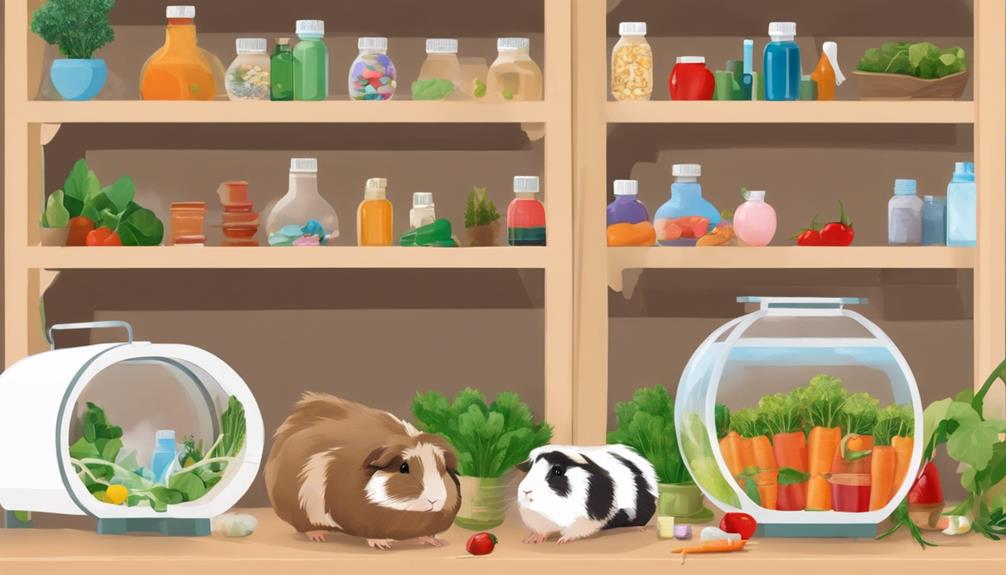
Managing Chronic Conditions in Elderly Guinea Pigs: Tips for Comfort and Care.
Learn how to support arthritis and heart health in aging guinea pigs with tailored management strategies.
Ensure their twilight years are filled with comfort and compassion by providing meticulous care and attention.
Key Takeaways
- Prioritize preventive care and early intervention to manage chronic conditions effectively.
- Implement pain management strategies tailored to the specific needs of elderly guinea pigs.
- Monitor weight, adjust diet, and provide nutritional supplements for optimal health.
- Create a suitable environment, exercise routine, and diet to support overall wellness in senior guinea pigs.
Understanding Elderly Guinea Pig Health
Understanding the intricacies of elderly guinea pig health requires a nuanced approach that prioritizes preventive care and early intervention. Pain management and the judicious use of mobility aids are important aspects of ensuring the well-being of these delicate creatures. Observing changes in behavior, such as decreased activity or reluctance to move, can signal the need for interventions like providing comfortable bedding or ramps to aid movement.
Additionally, weight management and the implementation of a suitable exercise routine tailored to the guinea pig's age and health status play a critical role in maintaining their overall wellness. Regular monitoring of weight and adjusting the diet accordingly can help prevent obesity-related issues that may exacerbate existing health conditions.
Identifying Arthritis in Guinea Pigs
Detecting arthritis in elderly guinea pigs requires keen observation of their movements and behaviors for subtle signs of joint discomfort and stiffness. As these small animals age, their joints may become stiff, leading to decreased mobility and potential pain. To help alleviate their discomfort, incorporating joint supplements can aid in maintaining joint health and reducing inflammation. Additionally, introducing mobility aids such as ramps or platforms can assist them in moving around more comfortably.
When managing arthritis in guinea pigs, it's essential to focus on pain management strategies. Providing a comfortable and padded living environment can help reduce pressure on their joints. Gentle exercise routines tailored to their abilities can also improve their mobility and prevent stiffness.
Dental Care for Aging Guinea Pigs
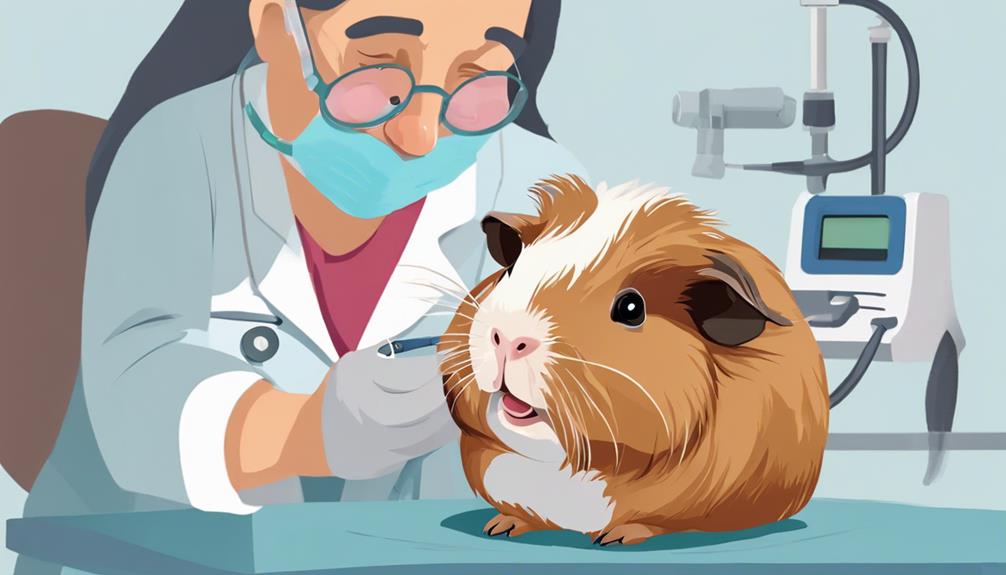
As guinea pigs age, their dental health becomes increasingly important. Monitoring their tooth grinding habits, ensuring regular dental check-ups, and providing a soft food diet are vital components of maintaining their oral well-being.
Tooth Grinding Habits
Aging guinea pigs exhibit unique tooth grinding habits that require special attention in their dental care routine. Preventing tooth decay in elderly guinea pigs is important as they're prone to dental issues which can lead to pain and discomfort.
Regularly monitoring their teeth and providing appropriate chew toys can help manage their tooth grinding tendencies. Ensuring a balanced diet rich in fiber is essential for maintaining dental health and preventing excessive wear on their teeth.
Pain management for guinea pigs experiencing tooth-related discomfort may include offering soft foods or seeking veterinary assistance when necessary. By being proactive in addressing tooth grinding habits, caregivers can greatly improve the quality of life for their elderly guinea pigs.
Regular Dental Check-Ups
Regular dental check-ups play an essential role in maintaining the oral health of elderly guinea pigs. Dental hygiene is key to preventing potential issues such as overgrown teeth or dental abscesses. Regular check-ups allow for early detection of any dental problems, ensuring prompt intervention and treatment.
By prioritizing preventive care and scheduling routine oral health examinations, caregivers can help their aging guinea pigs maintain healthy teeth and gums. These check-ups not only focus on current dental health but also serve as educational opportunities for caregivers to learn proper dental care techniques.
Ensuring regular dental check-ups for elderly guinea pigs is a proactive approach to promoting overall well-being and quality of life in these cherished pets.
Soft Food Diet
Prioritizing a soft food diet is paramount for maintaining the best dental health in elderly guinea pigs. As these furry companions age, their teeth may become more sensitive, requiring special dietary considerations. Here are key points to take into account:
- Nutritional Supplements: Integrate supplements like Vitamin C and calcium to support dental health.
- Feeding Schedule: Establish a consistent feeding routine to aid digestion and prevent dental issues.
- Appetite Stimulation, Weight Management: Encourage eating with enticing foods while monitoring weight to make sure a healthy balance.
Diet Adjustments for Chronic Conditions
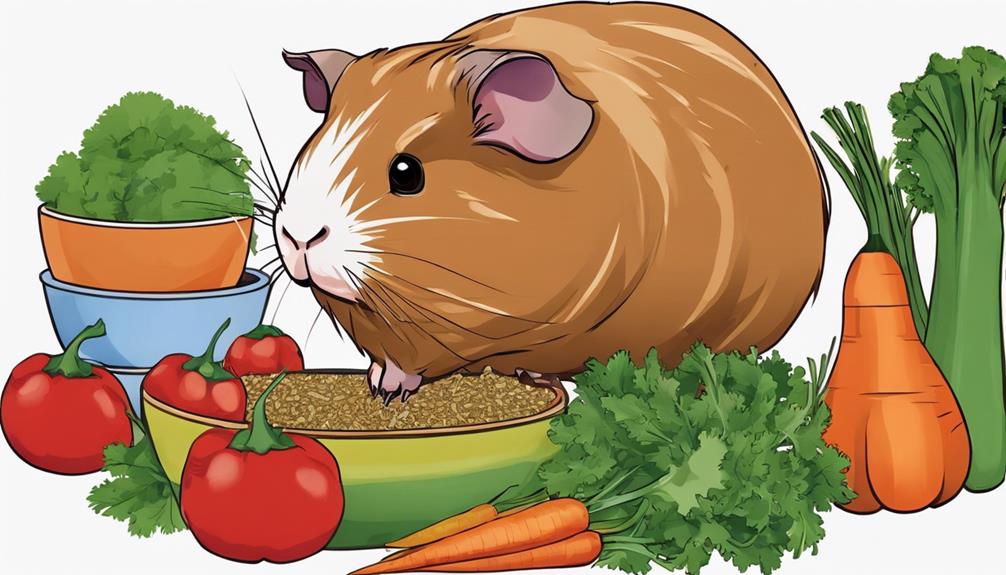
In managing chronic conditions in elderly guinea pigs, dietary adjustments play an essential role in promoting their overall well-being and quality of life. Guinea pigs with chronic conditions often require specific diets tailored to their needs to manage their health effectively. When it comes to diet adjustments for these senior pets, considerations such as nutritional supplements, meal planning, weight management, and portion control are critical aspects to focus on.
| Nutritional Supplements | Meal Planning | Weight Management |
|---|---|---|
| Vitamin C supplements can be beneficial for guinea pigs with arthritis. | Ensure a balanced diet that meets the nutritional needs of elderly guinea pigs. | Monitor their weight regularly and adjust the portion sizes accordingly. |
| Probiotics can aid in digestion for guinea pigs with gastrointestinal issues. | Offer a variety of fresh vegetables and limited fruits to provide essential nutrients. | Provide opportunities for exercise to help maintain a healthy weight. |
| Omega-3 fatty acids can help reduce inflammation in guinea pigs with heart conditions. | Consider hay-based pellets as a staple in their diet for fiber intake. | Seek veterinary advice if weight loss or gain is observed to address any underlying issues. |
Managing Respiratory Issues in Seniors
As elderly guinea pigs may experience respiratory issues, it's essential to explore effective management strategies.
Oxygen therapy options can greatly benefit seniors struggling with breathing difficulties, providing them with the necessary support to maintain their quality of life.
Monitoring cough frequency closely is also important in order to detect any changes in their respiratory health early on.
Oxygen Therapy Options
When considering managing respiratory issues in elderly guinea pigs, exploring various oxygen therapy options becomes essential for their well-being. Providing adequate oxygen levels is critical in maintaining their health and quality of life. Here are some key oxygen therapy options to contemplate:
- Portable Oxygen: Ensuring easy access to oxygen wherever the guinea pig may be located.
- Nebulizer Options: Delivering medication in a mist form to help alleviate respiratory symptoms effectively.
- Breathing Exercises and Enrichment Activities: Incorporating activities that promote healthy breathing patterns and mental stimulation.
Monitoring Cough Frequency
Exploring the frequency of coughing episodes in elderly guinea pigs provides valuable insights into managing respiratory issues as they age. Monitoring cough intensity can help gauge the severity of respiratory distress and guide appropriate treatment measures. Preventing respiratory distress in senior guinea pigs is critical for their overall well-being. Here is a table summarizing key points:
| Aspects to Think About | Actions to Take |
|---|---|
| Monitor Cough Frequency | Keep a Cough Diary |
| Assess Cough Intensity | Consult a Vet for Evaluation |
| Treat underlying causes | Provide Medication as Advised |
| Preventive Measures | Guarantee Clean Living Environment |
Skin and Coat Care for Elderly Piggies
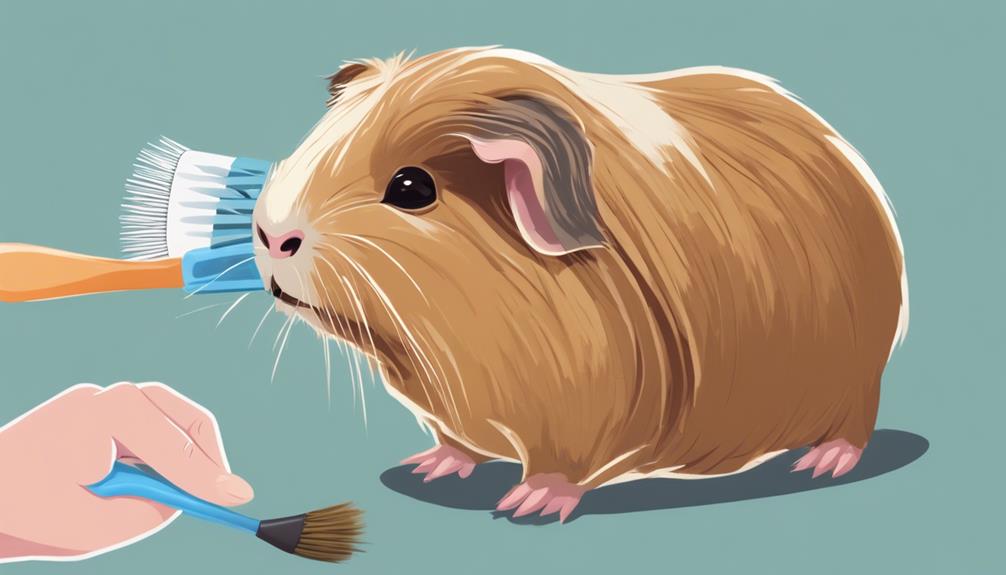
An important aspect of caring for elderly guinea pigs is making sure their skin and coat receive proper attention and maintenance. As these small creatures age, their skin sensitivity increases, and their coats may require extra care to keep them healthy and comfortable.
Here are some essential points to take into account:
- Grooming Techniques: Regular grooming helps elderly guinea pigs maintain a clean and healthy coat. Use a soft brush to gently remove loose hair and prevent matting. Be mindful of their delicate skin and handle them with care during grooming sessions.
- Shedding Patterns: Guinea pigs naturally shed their fur, especially during seasonal changes. Pay attention to any abnormal shedding patterns, as excessive hair loss could indicate an underlying health issue. Consult a veterinarian if you notice significant changes in your guinea pig's shedding habits.
- Skin Sensitivity and Coat Care: Older guinea pigs may develop dry skin or skin conditions that require special attention. Make sure their living environment is clean and comfortable, and think about using guinea pig-safe moisturizers or shampoos recommended by a veterinarian to keep their skin and coat in good condition.
Heart Health in Aging Guinea Pigs
As aging guinea pigs grow older, maintaining heart health becomes increasingly important to secure their overall well-being and longevity. Just like in humans, exercise routines play a key role in keeping their cardiac health in check. Encouraging gentle activities like supervised floor time or short walks in a safe environment can help promote circulation and overall cardiovascular fitness in aging guinea pigs.
Additionally, dietary considerations are essential for their cardiovascular health. Providing a well-balanced diet rich in vitamin C, fiber, and low in fats and sugars can support heart function and help prevent conditions like obesity that may strain the heart. Fresh vegetables like bell peppers, kale, and parsley are excellent choices to incorporate into their meals to support heart health.
Cognitive Support for Senior Cavy

To nurture the cognitive well-being of senior cavies, caregivers should prioritize mental stimulation through interactive toys and environmental enrichment. Senior guinea pigs, like humans, benefit from activities that keep their minds engaged and active.
Here are three key strategies to enhance memory and cognitive function in aging cavies:
- Rotate Toys Regularly: Introducing new toys and regularly rotating them can prevent boredom and encourage mental agility in senior cavies. Toys that provide challenges, such as puzzle feeders or treat-dispensing toys, can promote memory enhancement and cognitive stimulation.
- Create a Stimulating Environment: Enrich the guinea pig's living space with tunnels, hideouts, and different textures to explore. This environmental enrichment can stimulate the cavy's senses, promote curiosity, and support cognitive health.
- Interactive Playtime: Spend quality time interacting with your senior guinea pig through gentle play sessions. Simple activities like hiding treats for them to find or teaching them new tricks can create bonding opportunities while boosting their cognitive abilities.
Frequently Asked Questions
Can Elderly Guinea Pigs With Chronic Conditions Still Engage in Physical Exercise and Playtime?
Elderly guinea pigs with chronic conditions can still engage in physical exercise and playtime with modifications. Enrichment activities, social interaction, and mental stimulation are crucial for their well-being. Tailoring activities to their abilities guarantees a fulfilling and healthy life.
How Can I Help My Elderly Guinea Pig Cope With Anxiety or Stress Related to Their Chronic Condition?
To help an elderly guinea pig cope with anxiety or stress related to their chronic condition, provide comfort measures such as cozy bedding, soothing music, and gentle massages. Enrichment activities, behavioral modifications, and bonding techniques can also promote their well-being and happiness.
Are There Alternative Therapies or Supplements That Can Support the Management of Chronic Conditions in Elderly Guinea Pigs?
In supporting elderly guinea pigs with chronic conditions, herbal remedies, massage therapy, acupuncture, and nutritional supplements can offer holistic benefits. These alternative therapies may aid in managing discomfort, enhancing well-being, and promoting a higher quality of life.
How Often Should I Schedule Veterinary Check-Ups for My Elderly Guinea Pig With a Chronic Condition?
For best care, schedule veterinary check-ups every 3-6 months for elderly guinea pigs managing chronic conditions. These visits allow for monitoring medication management, adjusting dietary modifications, tracking exercise routines, and ensuring social interaction needs are met for overall well-being.
What Are Some Signs That Indicate a Decline in Cognitive Function in Senior Guinea Pigs, and How Can This Be Managed?
As time passes, signs of cognitive decline may manifest in senior guinea pigs. To address this, engage them in enrichment activities for mental stimulation. A balanced diet rich in essential nutrients can also support cognitive function in aging pets.

